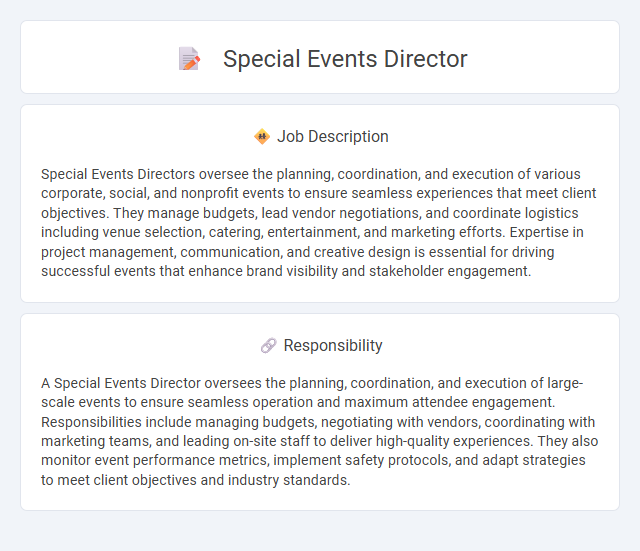
Special Events Directors oversee the planning, coordination, and execution of various corporate, social, and nonprofit events to ensure seamless experiences that meet client objectives. They manage budgets, lead vendor negotiations, and coordinate logistics including venue selection, catering, entertainment, and marketing efforts. Expertise in project management, communication, and creative design is essential for driving successful events that enhance brand visibility and stakeholder engagement.
Individuals with strong communication skills and high adaptability are likely to thrive as a Special Events Director, given the role's demand for constant interaction and quick problem-solving. Those who enjoy managing logistics under pressure and coordinating diverse teams may find this job suitable, whereas candidates who prefer routine tasks and minimal social engagement might struggle. The position probably requires resilience and a proactive mindset to handle the fast-paced, unpredictable nature of event planning effectively.
Qualification
A Special Events Director must possess exceptional project management skills and a proven track record in coordinating large-scale events. Expertise in budgeting, vendor negotiation, and team leadership is essential to ensure seamless event execution and maximum attendee satisfaction. Strong communication abilities and creativity are critical for designing unique event experiences aligned with organizational goals.
Responsibility
A Special Events Director oversees the planning, coordination, and execution of large-scale events to ensure seamless operation and maximum attendee engagement. Responsibilities include managing budgets, negotiating with vendors, coordinating with marketing teams, and leading on-site staff to deliver high-quality experiences. They also monitor event performance metrics, implement safety protocols, and adapt strategies to meet client objectives and industry standards.
Benefit
Special Events Director roles likely offer significant benefits such as opportunities for creative leadership and strategic planning in high-profile environments. These positions probably provide access to extensive professional networking and collaboration with diverse stakeholders. Candidates may experience enhanced career growth potential and increased job satisfaction through managing impactful, memorable events.
Challenge
Special Events Directors likely face the challenge of coordinating multiple complex logistics under tight deadlines, requiring exceptional organizational skills and adaptability. Managing diverse teams and vendor relationships may present ongoing hurdles, demanding strong communication and conflict-resolution abilities. Navigating unexpected changes or emergencies could test their problem-solving capabilities and capacity to maintain event quality.
Career Advancement
Special Events Directors lead large-scale event planning, gaining expertise in budgeting, vendor management, and team coordination that propels career growth into executive roles such as Director of Event Management or Chief Marketing Officer. Mastery of strategic event execution and stakeholder communication significantly enhances opportunities for leadership positions within corporate, nonprofit, or hospitality sectors. Continuous professional development through certifications like CMP (Certified Meeting Professional) and PMP (Project Management Professional) further accelerates advancement in the competitive events industry.
 kuljobs.com
kuljobs.com